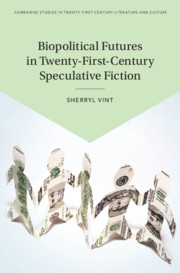Book contents
- Biopolitical Futures in Twenty-First-Century Speculative Fiction
- Cambridge Studies in Twenty-First-Century Literature and Culture
- Biopolitical Futures in Twenty-First-Century Speculative Fiction
- Copyright page
- Contents
- Acknowledgments
- Introduction
- Chapter 1 Suspending Death, Reinventing Life
- Chapter 2 The New Flesh
- Chapter 3 Capital Reproduction
- Chapter 4 Surplus Value
- Chapter 5 Life Industries
- Chapter 6 Living to Work
- Chapter 7 Life Optimized
- Chapter 8 Surplus Vitality and Posthuman Possibilities
- Conclusion
- Notes
- Bibliography
- Index
Chapter 6 - Living to Work
Biocapital, Synthetic Biology, and the Precaritization of Labor
Published online by Cambridge University Press: 16 September 2021
- Biopolitical Futures in Twenty-First-Century Speculative Fiction
- Cambridge Studies in Twenty-First-Century Literature and Culture
- Biopolitical Futures in Twenty-First-Century Speculative Fiction
- Copyright page
- Contents
- Acknowledgments
- Introduction
- Chapter 1 Suspending Death, Reinventing Life
- Chapter 2 The New Flesh
- Chapter 3 Capital Reproduction
- Chapter 4 Surplus Value
- Chapter 5 Life Industries
- Chapter 6 Living to Work
- Chapter 7 Life Optimized
- Chapter 8 Surplus Vitality and Posthuman Possibilities
- Conclusion
- Notes
- Bibliography
- Index
Summary
This chapter asks what happens as the commodification of life expands from biological tissues to the abstract concept of “life itself” now understood as a commodity. It draws on research on synthetic biology to analyze sf texts whose futures promise manufactured, nonhuman workers. Beginning with Philip K. Dick’s Do Androids Dream of Electric Sheep? this chapter considers how the globalized distribution of labour, and particularly a reliance on migrant labour that disavows civic belonging to such temporary workers, instantiates a dehumanizing precarity. Turning to the film adaptation of Dick’s novel, Blade Runner, and especially to its sequel, Blade Runner 2049, the chapter connects these imaginaries to discourses about synthetic biology that imagine life as a standard toolkit of reconfigurable metabolic functions. The chapter concludes with a reading of Rosa Montero’s Bruna Husky series, which directly references Blade Runner, a forceful critique of economic logics that reduce living beings to a means to economic ends. This series offers a posthumanist, multispecies vision of renewed political community as a remedy for the real subsumption of life by capital.
- Type
- Chapter
- Information
- Biopolitical Futures in Twenty-First-Century Speculative Fiction , pp. 134 - 156Publisher: Cambridge University PressPrint publication year: 2021

